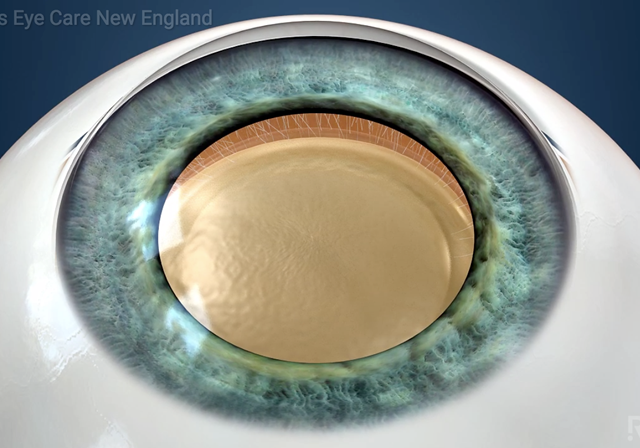Over time, if left untreated, the cloudiness can become worse. Symptoms of cataracts can include:
Without surgery, cataracts can eventually lead to significant vision loss. In the past, cataracts were typically treated with traditional cataract surgery. Today, patients with cataracts can benefit from advances in cataract treatment. Let’s start by looking at traditional cataract surgery, which is still performed successfully today, before moving onto the newer and also successful treatments. Traditional Cataract SurgeryTraditional cataract surgery involves removing the cloudy lens through an incision in the cornea. First, an incision is made in the cornea, and a special instrument is inserted through the incision and behind the pupil to visualize the lens capsule. The surgeon creates an opening in the lens capsule and uses sound waves to break-up the cloudy lens. The cloudy lens is suctioned out, and an intraocular lens is implanted and positioned in the same location as your natural lens. To learn more about traditional cataract surgery, visit our webpage: Traditional Cataract Surgery. Laser Cataract SurgeryThe most significant Advances in cataract surgery include the use of lasers. When laser cataract surgery is performed, an ultrasound device is used first to gather important details about the lens and to map the surface of the eye. The information gathered from the ultrasound is transmitted to a highly specialized computer that programs the laser for custom laser surgery. Information, such as the depth and exact location of the incision is sent to the laser. The laser is then used to make the incision in the cornea and the lens capsule. Similar to transitional cataract surgery, sound waves are used to break-up the cloudy lens, so it can be suctioned out. The intraocular lens is then implanted. Laser cataract surgery helps the surgeon make precise incisions and may improve accuracy in lens placement. Although it seems that more precise incisions would improve outcomes, it’s not clear laser cataract surgery is more effective than traditional surgery. According to the America Academy of Ophthalmology, studies have not indicated that laser cataract surgery results in better visual outcomes than traditional surgery. Both types of cataract surgery have their pros and cons. It’s best to discuss your options with your ophthalmic surgeon to determine which choice is best for you and your particular condition. To learn more about laser cataract surgery, visit our webpage: All-Laser Cataract Surgery. New Technology Improves Cataract SurgeryWhether laser cataract surgery or traditional cataract surgery is performed, most people see an improvement in their vision. Slight miscalculations regarding intraocular lens position or inadequate selection of the lens power can affect outcomes, however. As such, new devices and advances in technology are being used to improve the effectiveness of cataract surgery, including: Intraoperative Wavefront Aberrometry Intraoperative wavefront aberrometry is a device that measures the refractive error of the eye. Using intraoperative wavefront aberrometry helps the doctor determine the most appropriate lens power for implantation during surgery. Light Adjustable Lens In 2017, the FDA approved a light adjustable lens, along with its delivery device, for cataract surgery. The lens is used for people having cataract surgery that have astigmatism. After the light adjustable lens is implanted during cataract surgery, the power can be fine-tuned during follow up appointments. Can Eye Drops Be Used to Treat Cataracts? Research has been conducted to develop alternatives to surgery for treating cataracts. One treatment studied is eye drops containing lanosterol. Lanosterol is a naturally occurring steroid.
To understand more about how lanosterol may work, it’s helpful to learn a bit more about lenses in the eyes and cataracts. The lens is made up in part of crystallin protein. The protein keeps the lens clear. But as we age, the protein may start to clump together, which clouds areas of the lens. The theory is lanosterol may disintegrate the protein buildup and stop the cataract from developing further. While it sounds promising, eye drops have not yet been proven to be effective in treating or preventing cataracts. Further, the FDA has not yet approved any type of eye drop to treat cataracts. Studies have been conducted on mice and dogs and show promise, but additional research needs to be completed before it will be available for humans. Research continues on new methods to treat cataracts, which will hopefully further improve the efficiency and ease of treatment. In the meantime, surgery, whether laser or traditional, to treat cataracts is considered safe and effective for most people. If you have any questions about cataracts or your vision, or if you would like to schedule an appointment or eye exam with one of our eye doctors, please call our office at 508-746-8600. To learn more about our cataract surgeons, please visit the following links: Comments are closed.
|
EYE HEALTH BLOGCategories
All
Archives
July 2024
|
|
Kadrmas Eye Care New England
55 Commerce Way, Plymouth, MA 02360
14 Tobey Road, Wareham, MA 02571 133 Falmouth Road (Rt 28), Mashpee, MA 02649 |
Phone Number:
1-508-746-8600 Hours: Monday through Friday — 8 AM – 4:30 PM |


 RSS Feed
RSS Feed
